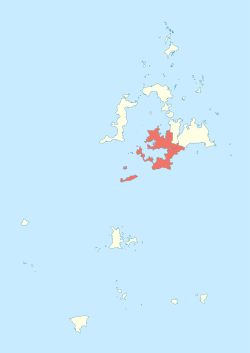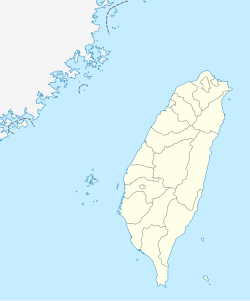You can help expand this article with text translated from the corresponding article in Chinese. (October 2012) Click for important translation instructions.
|
| Magong 馬公市Makō, Makung | |
|---|---|
| County-administered city | |
 | |
 Seal Seal | |
 Magong City in Penghu County Magong City in Penghu County | |
 | |
| Coordinates: 23°34′N 119°35′E / 23.567°N 119.583°E / 23.567; 119.583 | |
| Country | Republic of China (Taiwan) |
| Province | Taiwan Province (streamlined) |
| County | Penghu |
| Government | |
| • Mayor (市長) | Huang Jian-jhong |
| Area | |
| • Total | 33.9918 km (13.1243 sq mi) |
| Population | |
| • Total | 63,745 |
| • Density | 1,900/km (4,900/sq mi) |
| Website | www.mkcity.gov.tw |
| Magong City | |||||||||||||||||||||||||||||
|---|---|---|---|---|---|---|---|---|---|---|---|---|---|---|---|---|---|---|---|---|---|---|---|---|---|---|---|---|---|
| Chinese name | |||||||||||||||||||||||||||||
| Traditional Chinese | 馬公市 | ||||||||||||||||||||||||||||
| Literal meaning | Horse Lord(or “Mazu Temple” for the original name) | ||||||||||||||||||||||||||||
| |||||||||||||||||||||||||||||
| Port Magong | |||||||||||||||||||||||||||||
| Traditional Chinese | 媽宮澳 | ||||||||||||||||||||||||||||
| Literal meaning | Port of the Mother's Palace | ||||||||||||||||||||||||||||
| |||||||||||||||||||||||||||||
| Japanese name | |||||||||||||||||||||||||||||
| Kanji | 馬公市 | ||||||||||||||||||||||||||||
| |||||||||||||||||||||||||||||

Magong (POJ: Má-keng) is a county-administered city and seat of Penghu County, Taiwan. Magong City is located on Penghu's main island.
Name
The settlement's temple honoring the Chinese Goddess Mazu, the deified form of Lin Moniang from medieval Fujian Province, is usually accounted the oldest in all of Taiwan and Penghu. The town was originally named Makeng (Chinese: 媽宮; Pe̍h-ōe-jī: Má-keng; lit. 'Mazu's palace') but was changed to Makō (馬公) during Japanese rule in 1920, and was the center of the Mako Guard District.
After 1945, the Wade-Giles romanization Makung was used. Taiwan officially adopted Tongyong Pinyin in 2002 and Hanyu Pinyin in 2009, leading to the romanization Magong.
History
The island's Mazu temple was erected in the late 16th or early 17th century. The city Magong'ao began to grow around 1887, during the rule of the Qing dynasty.
Under Japanese rule, the settlement was renamed Makō and organized as a subprefecture of Hōko. The area was a major base of the Imperial Japanese Navy. It was an embarkation point for the invasion of the Philippines during the Second World War.
Republic of China
On 25 December 1981, Makung was upgraded from an urban township to a county-administered city.
Administration
 |
 |
Magong City contains 33 municipal villages (里; lǐ):
- (Romanizations are in Hanyu Pinyin)
- Fuxing (復興里)
- Chang'an (長安里)
- Zhongyang (中央里)
- Qiming (啟明里)
- Chongqing (重慶里)
- Zhongxing (中興里)
- Guangfu (光復里)
- Guangming (光明里)
- Guangrong (光榮里)
- Chaoyang (朝陽里)
- Yangming (陽明里)
- Chongguang (重光里)
- Xiwei (西衛里)
- Xiwen (西文里)
- Dongwen (東文里)
- Anshan (案山里)
- Guanghua (光華里)
- Qianliao (前寮里)
- Shiquan (石泉里)
- Caiyuan (菜園里)
- Dongwei (東衛里)
- Anzhe (安宅里)
- Xingren (興仁里)
- Wukan (烏崁里)
- Tiexian (鐵線里)
- Suogang (鎖港里)
- Shanshui (山水里)
- Wude (五德里)
- Jing'an (井垵里)
- Shili (時里奇)
- Fenggui (風櫃里)
- Hujing (虎井里) centred on Hujing Islet (虎井嶼; Hóo-tsínn-sū)
- Tongpan (桶盤里) centred on Tongpan Island (桶盤嶼; Tháng-puânn-sū)
Government institutions
Education
Energy

The city is powered by the Hujing Power Plant located on Table Island.
Climate
Magong has a very warm humid subtropical climate under the Köppen system. Due to the maritime influence, diurnal temperature variation is very low, but in spite of being right on the boundary with the tropics and having 15 °C (59 °F) winter lows it falls short of being such a climate. This is courtesy of the influence of the cool Asian landmass and prevailing winds in winter. As a result, the coldest month just falls short of the 18 °C (64 °F) isotherm. In summer, Magong receives monsoonal rainfall with moderated but hot temperatures. While afternoons most often stay in the low 30's Celsius, nights remain above 25 °C (77 °F) for several months. It is drier than many mainland areas of Taiwan, although it still frequently is cloudy.
| Climate data for Magong City (1991–2020 normals, extremes 1897–present) | |||||||||||||
|---|---|---|---|---|---|---|---|---|---|---|---|---|---|
| Month | Jan | Feb | Mar | Apr | May | Jun | Jul | Aug | Sep | Oct | Nov | Dec | Year |
| Record high °C (°F) | 28.6 (83.5) |
29.5 (85.1) |
30.8 (87.4) |
33.0 (91.4) |
34.2 (93.6) |
35.9 (96.6) |
36.7 (98.1) |
35.2 (95.4) |
35.1 (95.2) |
35.3 (95.5) |
31.1 (88.0) |
30.0 (86.0) |
36.7 (98.1) |
| Mean daily maximum °C (°F) | 19.4 (66.9) |
20.0 (68.0) |
22.9 (73.2) |
26.3 (79.3) |
29.1 (84.4) |
30.9 (87.6) |
32.2 (90.0) |
31.8 (89.2) |
31.0 (87.8) |
28.2 (82.8) |
25.1 (77.2) |
21.3 (70.3) |
26.5 (79.7) |
| Daily mean °C (°F) | 17.1 (62.8) |
17.4 (63.3) |
19.9 (67.8) |
23.2 (73.8) |
25.9 (78.6) |
27.9 (82.2) |
28.9 (84.0) |
28.6 (83.5) |
28.0 (82.4) |
25.5 (77.9) |
22.7 (72.9) |
19.1 (66.4) |
23.7 (74.6) |
| Mean daily minimum °C (°F) | 15.5 (59.9) |
15.6 (60.1) |
17.8 (64.0) |
21.1 (70.0) |
24.0 (75.2) |
25.9 (78.6) |
26.7 (80.1) |
26.6 (79.9) |
26.1 (79.0) |
24.0 (75.2) |
21.3 (70.3) |
17.7 (63.9) |
21.9 (71.4) |
| Record low °C (°F) | 7.7 (45.9) |
7.2 (45.0) |
7.4 (45.3) |
10.5 (50.9) |
16.6 (61.9) |
19.3 (66.7) |
21.8 (71.2) |
21.1 (70.0) |
19.2 (66.6) |
15.0 (59.0) |
9.6 (49.3) |
9.0 (48.2) |
7.2 (45.0) |
| Average precipitation mm (inches) | 20.9 (0.82) |
38.1 (1.50) |
50.7 (2.00) |
77.9 (3.07) |
117.8 (4.64) |
148.0 (5.83) |
163.2 (6.43) |
229.4 (9.03) |
100.3 (3.95) |
30.1 (1.19) |
26.0 (1.02) |
28.1 (1.11) |
1,030.5 (40.59) |
| Average precipitation days (≥ 0.1 mm) | 5.2 | 6.2 | 7.6 | 8.7 | 9.3 | 10.2 | 8.1 | 9.4 | 5.6 | 2.4 | 3.6 | 4.8 | 81.1 |
| Average relative humidity (%) | 78.7 | 80.7 | 80.0 | 80.9 | 82.8 | 85.2 | 83.6 | 84.4 | 79.6 | 75.2 | 76.8 | 76.8 | 80.4 |
| Mean monthly sunshine hours | 102.9 | 98.7 | 131.1 | 153.1 | 183.6 | 211.2 | 265.3 | 231.4 | 214.9 | 186.4 | 129.2 | 111.4 | 2,019.2 |
| Source: Central Weather Bureau | |||||||||||||
Tourist attractions


- Central Street
- Chang Yu-sheng Memorial Museum
- Erdai Art Hall
- Fenggui Cave
- Fengguiwei Fort
- First Guesthouse
- Four-eyed Well
- Jinguitou Fortress
- Magong Beiji Temple
- Magong Old City Wall
- Mazu Temple
- Ocean Resources Museum
- Penghu Living Museum
- Penghu Reclamation Hall
- Pier 3
- Shigong Temple
- Suogang Fishing Port
Transportation
Penghu Airport operates domestic flights and Magong Harbor hosts ferry connections to Kaohsiung, Tainan, Chiayi and Kinmen.
Notable natives
- Chang Yu-sheng, former singer, composer and producer
- Pan An-bang, former singer, TV presenter and actor
- Tsai Chih-chan, poet and educator
References
- "History". Magong City Office. Archived from the original on 8 April 2014.
- 里鄰介紹. 澎湖縣馬公市公所 Magong City Office, Penghu County (in Chinese (Taiwan)). Retrieved 12 November 2019.
- "Monthly Mean". Central Weather Bureau. Archived from the original on 9 December 2022. Retrieved 29 November 2022.
- "氣象站各月份最高氣溫統計" (PDF) (in Chinese). Central Weather Bureau. Archived (PDF) from the original on 17 October 2022. Retrieved 29 November 2022.
- "氣象站各月份最高氣溫統計(續)" (PDF) (in Chinese). Central Weather Bureau. Archived (PDF) from the original on 17 October 2022. Retrieved 29 November 2022.
- "氣象站各月份最低氣溫統計" (PDF) (in Chinese). Central Weather Bureau. Archived (PDF) from the original on 19 February 2022. Retrieved 29 November 2022.
- "氣象站各月份最低氣溫統計(續)" (PDF) (in Chinese). Central Weather Bureau. Archived (PDF) from the original on 19 December 2022. Retrieved 29 November 2022.
External links
- [REDACTED] Geographic data related to Magong at OpenStreetMap
| Administrative divisions of Taiwan | |||||
|---|---|---|---|---|---|
| Special municipalities (6) | |||||
| "Provinces [zh]" |
| ||||
| Districts under special municipalities / cities Cities / townships under counties | List of townships/cities and districts in Taiwan | ||||
| |||||
| Administrative divisions of outlying islands of Taiwan | ||
|---|---|---|
| Kaohsiung |  | |
| Kinmen | ||
| Lienchiang | ||
| Penghu | ||
| Pingtung | Liuqiu Island | |
| Taitung | ||
| Yilan | Toucheng (Guishan Island and Diaoyutai Islands) | |
| Lienchiang County commonly known as Matsu. Diaoyutai Islands are controlled by Japan, (called Senkaku Islands). Seat of the outlying islands' counties | ||